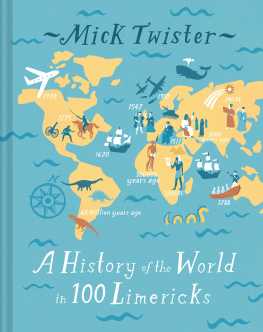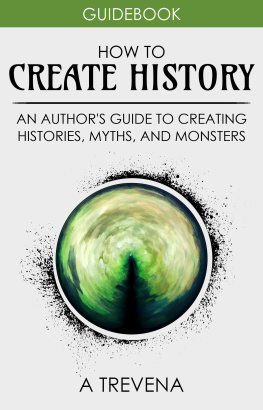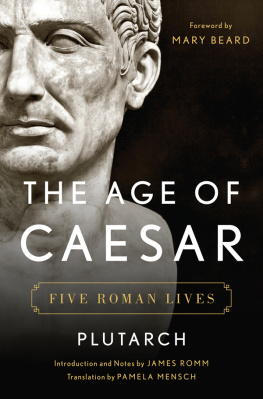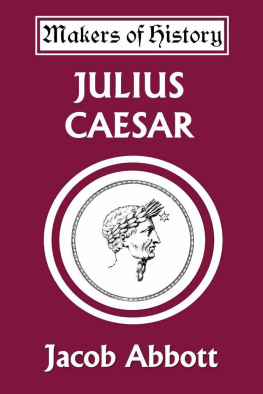Contents
Guide
CONTENTS
A NOTE ON SOURCES
The further in history you go
The harder the facts are to know
Cos the things that youre lible
To read in the Bible
It aint necessarily so.
(With apologies to George and Ira Gershwin)

HELLO THERE!
The bard said that wits soul is brevity
So writing a history with levity
Must by definition
Mean sins of omission
Because of our planets longevity.
Trying to reflect the history of the world in 100 limericks is an absurd task, and I apologise if my selection of events seems spurious or idiosyncratic, Euro- or Anglo-centric, or merely ec-centric. Many important historical topics were left out or skimmed over simply because I couldnt get any humour out of them, or find a decent rhyme (never mind an indecent one, which is always preferable).
The form naturally lends itself to the Great Man (or Woman) school of history. Thats because limericks arent quite as good at analysing patterns of land tenure in medieval European agrarian societies as they are at mocking William the Conquerors prodigiously large belly. Long before Edward Lear, limericks were part of an oral tradition that used humour to prick the egos of the pompous and powerful.
Many of the limericks revolve around well-known anecdotes, for which in a lot of cases there is not a shred of evidence. But that in itself often says something about how those subsequently recording history wanted to remember this or that person of note.
_________
GLOBALISATION
There once was a great ball of gas
That cooled to a big solid mass,
And that was the birth
Of the planet named Earth
We werent there to see it, alas.

Well, you have to start somewhere, dont you? So, skipping rapidly over the first two thirds of the 13.75 billion years since the Big Bang created the Universe, lets pick up the story about four and a half billion years ago.
A big rotating cloud of gas and dust, mainly hydrogen and helium, resolved itself into the Solar System, with rings around the Sun tending to form into gassy clumps one of which was the Earth.
After all that excitement, Earth felt it was time to settle down and start forming some solid foundations for future life like rocks and water. A place with a bit of atmosphere. We have no eyewitness testimony, of course. But scientists reckon it took up to a billion years to create the kind of conditions in which a self-respecting proto-cell of living matter might consider replicating.
THEYNEVERSAURUS
The dinosaurs like Allosaurus
Died out quite a long time before us
Which worked in our favour
Weve such a nice flavour,
I doubt that theyd want to ignore us.
Over time, the simple organisms that were the Earths early inhabitants had kids who were smarter than them: some became plants; the best swimmers got to be fish; the more mobile ones were insects; while the good all-rounders turned into amphibians.
But the ones who ate all their greens or their meat, depending on the species grew up to be dinosaurs, and theyre the early Earth inhabitants who fascinate us the most. They ran the show throughout the Jurassic and Cretaceous periods, from about 200 million to about 65 million years ago.
The largest dinosaurs, such as Diplodocus and Argentinosaurus, were 18 metres tall, but vegetarian. Carnivores like Allosaurus and Tyrannosaurus Rex were midgets by comparison probably only the size of a double-decker bus!
HOMO ON THE RANGE
Homo sapiens came on the scene
In Africa, mid-Pleistocene,
Though Homo erectus
Appears to connect us
With earlier apes there had been.
Quite a long time after the dinosaurs had died out, we decided it was safe to evolve. Its probably about 57 million years since human ancestors diverged from chimpanzee ones, but modern humans only evolved about 200,000 years ago, which to a palaeontologist is almost as recent as the 1970s.
There were a few early versions of Homo for whom things didnt work so well. Theres disagreement over whether Homo erectus was one of these (stop sniggering at the back, it means standing up man), but Homo neanderthalis certainly was.
We tend to view the Neanderthals as big thickos, but it now seems their brains may have been bigger than ours. And they were stronger. So how did we gain the upper hand evolution-wise? We must just have been meaner.
OLD MASTERS
There were some old folks in Lascaux,
A terribly long time ago,
Who drew on the walls
Of their cavernous halls.
Why they did it, we dont rightly know.
Various things set humans apart from our close relatives as we continued to evolve. Use of tools was one, and art another. As long as 32,000 years ago, early humans started to scratch marks on the walls of caves, and even to colour with charcoal and ochre.
Lascaux, in south-west France, is one of the best-known sites for cave paintings, with 2,000 figures, including horses and bulls, dating from about 17,300 years ago. And this primitive European school of art had counterparts in Asia and South America. Not being easily able to attend each others gallery openings, they appear to have evolved independently.
We dont know why they did it. But it certainly made sense to paint in caves, where the cool dark atmosphere has allowed them to survive a lot longer than one of Damien Hirsts pickled sharks.
THE FIRST ACCOUNTANTS
Some of the earliest writing
Was used to tell stories of fighting,
While ancient Sumerians
Logged their experience
And their accounts (less exciting).
Those old cave paintings may have been used to tell stories, even if the plots didnt get much beyond man meets deer, man kills deer, man eats deer. But it was a short step from that to pictograms communication using pictures instead of words.
Writing proper seems to have been invented in several parts of the world quite separately, but the first writers whose work weve been able to decode were the Sumerians of Mesopotamia in modern Iraq around 3500 BC.
Now, tales of great victories and epic journeys could not only be told ad nauseam around the camp-fire or banqueting table, they could be written down for posterity. But the Sumerians were also traders, and writing enabled them to keep business records not tablet-turners, perhaps, but thrilling to archaeologists.
GIZA GEEZER
There was an old pharaoh from Giza,
Some 2,000 years before Caesar,
Had a pyramid built
So his flesh wouldnt wilt,
As wed yet to invent the deep-freezer.

About 800 miles away, another great civilisation was growing up along the Nile, where the ancient Egyptians created lasting artworks, buildings and monuments that still fill museums around the world.















